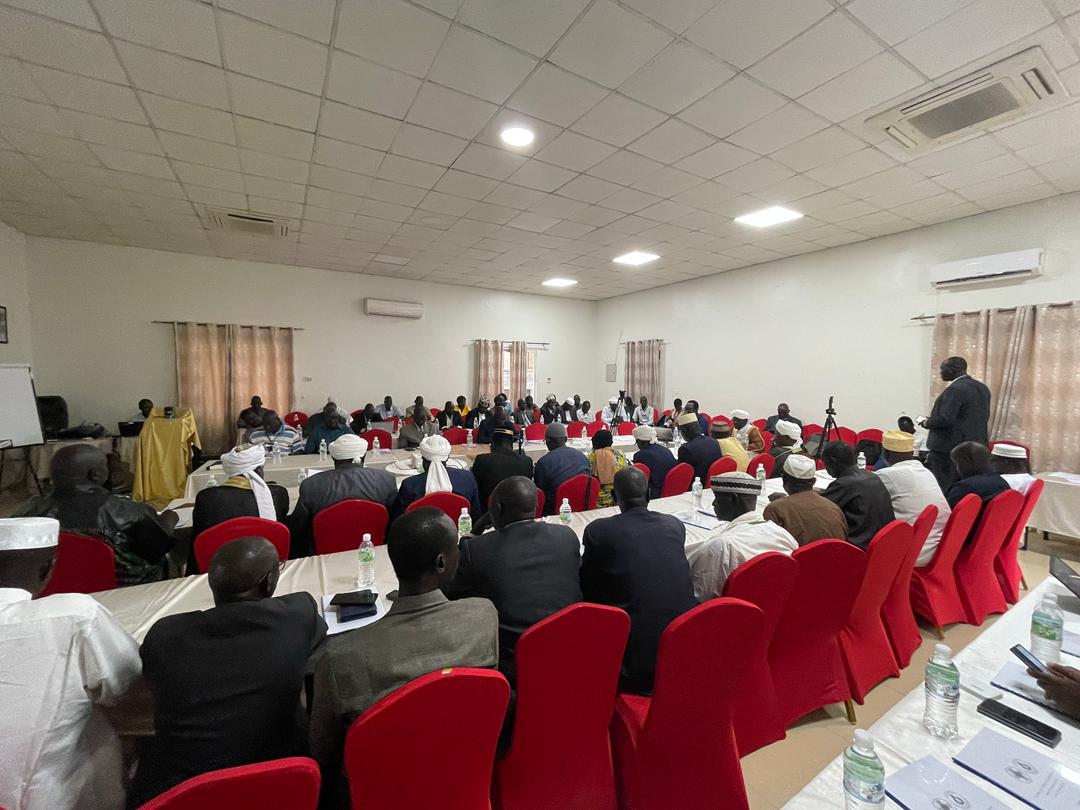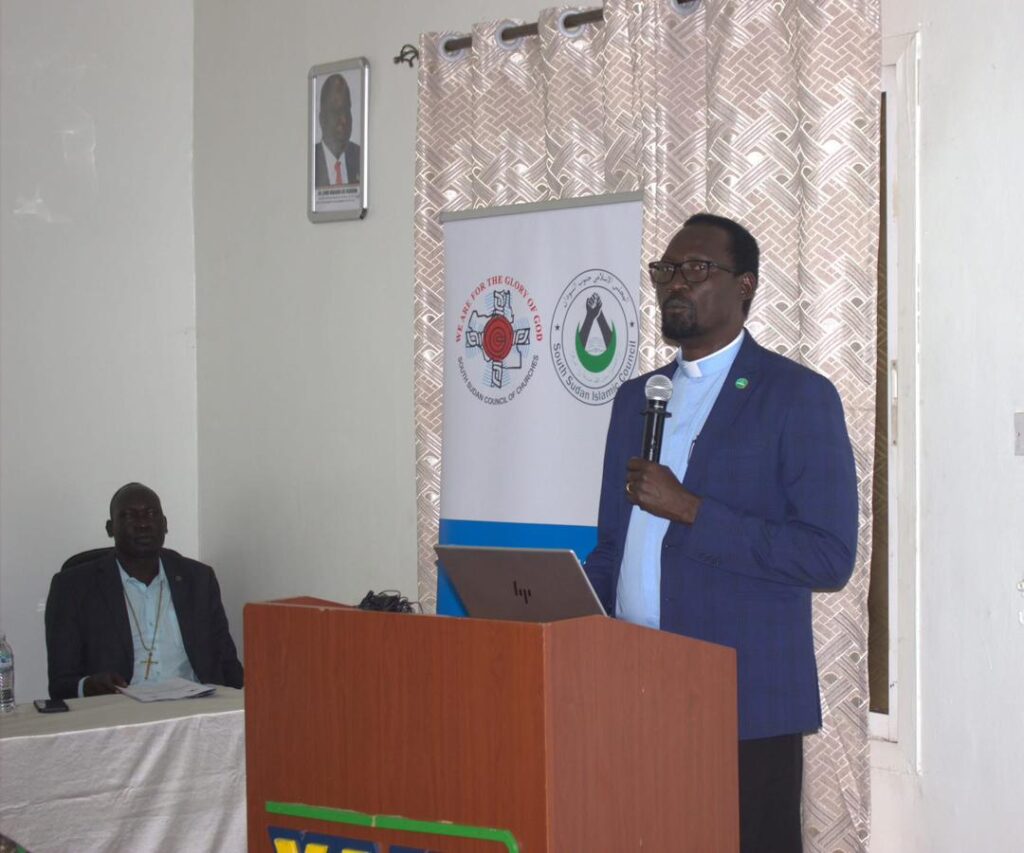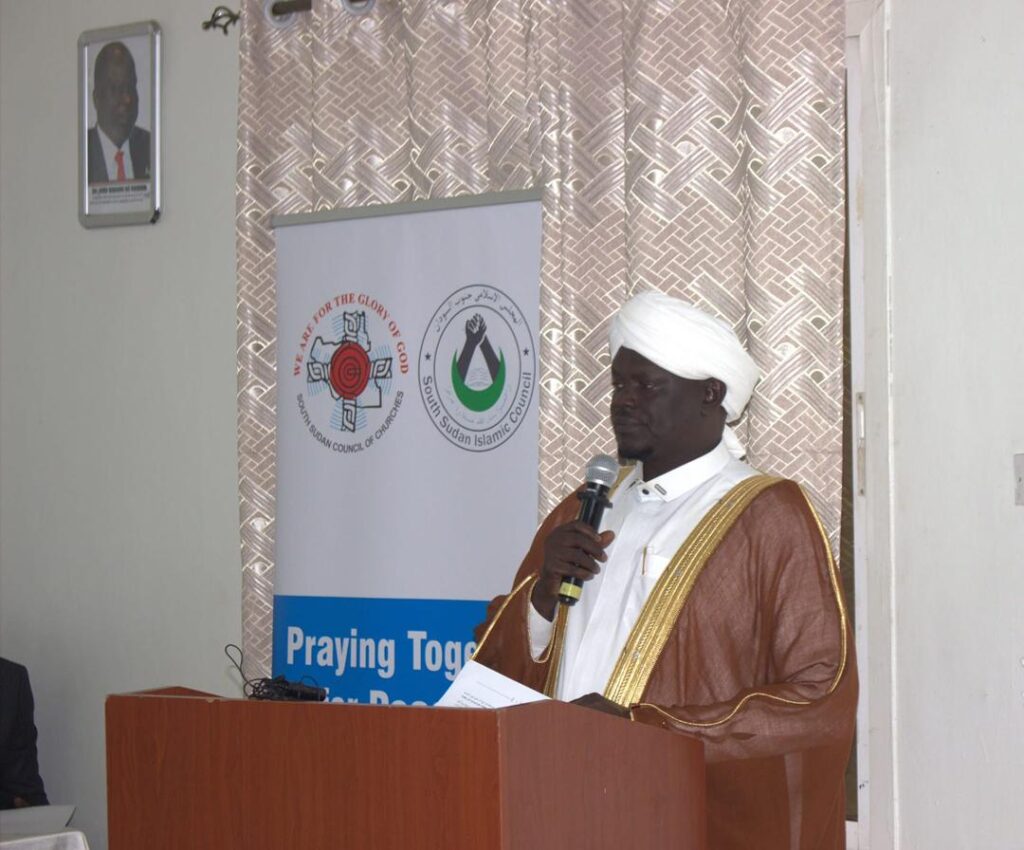
Faith leaders gathering at Yam Hotel for a Peace Conference, held from 1-2 Oct 2025, Juba, South Sudan
Juba, South Sudan – The South Sudan Council of Churches General Secretary, Rev. Tut Kony, left participants with waves of goosebumps after posing thought-provoking questions at the groundbreaking two-day National Faith and Peace Conference held from 2–3 Oct 2025 in Juba.
The conference, supported by UNMISS, brought together more than 80 Christian and Muslim faith leaders from across the country’s 10 states and two administrative areas. About 70% of participants were national and Juba-level representatives, while 30% came from the South Sudan Council of Churches and the South Sudan Islamic Council. The event convened under the theme: “Together, Let’s Pray for South Sudan.”
The gathering aimed to harness the positive role of faith-based actors in advancing peace and reconciliation, with objectives to:
• Strengthen the capacity of religious and community leaders to support South Sudan’s peace processes.
• Sensitise faith leaders on guiding communities through constitution-making, electoral preparations, and resilience to climate-related threats.
• Foster collaboration to ease tensions and promote peaceful coexistence.
• Coordinate joint messaging to urge political leaders to uphold their obligation to restore peace in South Sudan.

Rev. Tut Kony Nyang, General Secretary, South Sudan Council of Churches, giving a speech during a National Faith and Peace Conference Held in Juba, South Sudan, Oct 1-2, 2025
In his remarks, Rev. Tut Kony stressed the urgent responsibility of faith leaders to work together in advancing peace across South Sudan.
“Why are we here? Why were we brought from the states to Juba?” he asked. “It is because our people continue to cry out for peace and justice. As faith leaders, we carry moral power and an obligation to ensure our people can live in peace.”
He challenged participants to reflect on their role in times of conflict, need, and desperation: “How can we, Christians and Muslims together, heal the wounds of our nation and reconcile our people? What message will we take from this room back to our leaders and communities?”
A powerful call to action: “If not you, who will build and bring peace to this country? If not you, who will heal this nation? Who will make peace? And if not now, then when?
The Way Forward
Closing Remarks- Rev. Tut Kony, As we come to a close of this National Faith and Peace Conference, I stand here with gratitude to Almighty God, who has sustained us through these two days of reflection, dialogue, and prayer.
We gather here as Christian and Muslim leaders, united by our shared conviction that South Sudan can — and must become a nation of peace. Together, we have wrestled with the painful realities of our people: conflict, mistrust, displacement, poverty, and brokenness. Yet, we have also embraced the hope that faith brings — the hope of reconciliation, healing, and new beginnings.
In 2 Corinthians 5:11-21, the Bible reminds us of a profound truth: God reconciled us to Himself through Christ and gave us the ministry of reconciliation. This word speaks directly to us today. We are not only called to receive reconciliation, but to become ambassadors of reconciliation in our communities and in our nation.
What does this mean for us as faith leaders?
First, it means we must lead by example. As we said at the beginning of this conference, if we are to heal this land, reconciliation must begin with us. Our voices, our actions, and our unity must reflect God’s love and forgiveness. Where there is hatred, let us sow love. Where there is division, let us build bridges.
Second, it means we must guide our people with courage. South Sudan stands at a crossroads: between peace and renewed conflict, between hope and despair. Our communities look to us for moral direction. We cannot remain silent. We must call our leaders to honour their commitments, to uphold justice, and to protect the lives of the people entrusted to their care.
Third, it means we must work together — Christians and Muslims, side by side. This conference has shown us that unity is possible. The God who created us all desires peace for all. When we speak together with one voice, our message is stronger. When we work together, our witness is credible.
The Call to Reconciliation
Dear friends, reconciliation is not easy. It demands humility, forgiveness, and sacrifice. But reconciliation is the only path to lasting peace. As Paul reminds us, we are Christ’s ambassadors, as though God were making His appeal through us.
As we leave this place, let us carry with us not only the strategies and frameworks we have developed, but also the spirit of reconciliation. Let us return to our states, villages, mosques, and churches as peacemakers, healers, and bridge-builders. Let us remind our communities that peace is not only a political agreement — it is a divine calling.
Meanwhile, the South Sudan Islamic Council General Secretary, Sheikh Dr Abdalla Barag Rwal, expressed gratitude to the United Nations Mission in South Sudan and highlighted the importance of the national faith conference and the urgent need for reconciliation, even when it means compromises are made. During his Speech, Sheikh Abdalla added that Islam is Peace

Sheikh Dr Abdalla Barag Rwal at SSCC-SSIC National Faith and Peace Conference, Held on 1-2 October 2025
Moreso, Madam Hiroko Hirahara, Director of Civil Affairs Division UNMISS,
Reaffirms its Commitment to fostering peace and supporting church led initiatives. Citing that religious leaders have a heavy responsibility to resolve the conflict and create peace in their area. We stand ready to support. ”As I mentioned, we don’t have money now. But from this point onwards, our focus is going to be on the civil society and religious leaders. We know we are working with you closely already. But let us bring our hands together even tighter. Because there are a lot of things that we have to do. We have to amplify the voices of the people that does not have access to express themselves. We have to do everything possible to provide that platform to the people. We have to do this because if not, we’re doing a disservice to the people, so that’s our obligation as an amnesty. So let us work closely together.
The end
